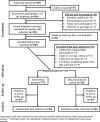Padres Preparados, Jóvenes Saludables: intervention impact of a randomized controlled trial on Latino father and adolescent energy balance-related behaviors
- PMID: 36258168
- PMCID: PMC9578196
- DOI: 10.1186/s12889-022-14284-5
Padres Preparados, Jóvenes Saludables: intervention impact of a randomized controlled trial on Latino father and adolescent energy balance-related behaviors
Abstract
Background: Studies have shown associations among food and activity behaviors and body weight of Latino fathers and adolescents. However, few Latino father-focused interventions have been designed to improve energy balance-related behaviors (EBRBs) and weight status among early adolescents. Thus, this efficacy study aims to evaluate the Padres Preparados, Jóvenes Saludables (Padres) youth obesity prevention program for positive changes in EBRBs (fruit, vegetable, sugar-sweetened beverage (SSB), sweet/salty snack, and fast-food consumption, physical activity, and screen time) and weight status among low-income Latino fathers and adolescents (10-14 years).
Methods: A two-arm (treatment versus delayed-treatment control group) randomized controlled trial was conducted to evaluate the efficacy of 8 weekly experiential learning sessions (2.5 hours each) based on social cognitive theory. The sessions included food preparation, parenting skills, nutrition, and physical activity. The program was delivered to father-adolescent dyads (mothers were encouraged to attend) in trusted community-based settings in a Midwest metropolitan area between 2017 and 2019. In March 2020, in-person implementation was discontinued due to COVID-19 pandemic restrictions, which limited the sample size. Father/adolescent dyads were randomized to treatment or control group within each site. Surveys and measurements were completed by fathers and adolescents to assess changes in food and activity behaviors from baseline to post-intervention. Adolescents also completed 24-hour dietary recall interviews at baseline and post-intervention. Intervention effects were assessed using linear regression mixed models adjusted for covariates and accounting for clustering of participants within sites.
Results: Data from 147 father/adolescent dyads who completed at least the baseline data collection were used. No significant differences were observed for baseline to post-intervention changes in adolescents' and fathers' EBRBs or weight status between treatment and control groups. Fathers' SSB and fast food intakes were not statistically significant (p = 0.067 and p = 0.090, respectively).
Conclusions: The Padres program resulted in no significant improvements in adolescent and father EBRBs and weight status. Additional Latino father-focused interventions are needed to examine intervention effects on EBRBs among Latino adolescents.
Trial registration: The Padres Preparados, Jóvenes Saludables study is registered with the U.S. National Library of Medicine, ClinicalTrials.gov Identifier: NCT03469752 (19/03/2018).
Keywords: Child obesity prevention; Community-based intervention; Energy balance-related behaviors; Intervention; Latino adolescents; Latino fathers; Randomized control trial.
© 2022. The Author(s).
Conflict of interest statement
The authors declare that they have no competing interests.
Figures
References
-
- Fryar CD, Carroll MD, Afful J. Prevalence of overweight, obesity, and severe obesity among children and adolescents aged 2–19 years: United States, 1963–1965 through 2017–2018: National Center for Health Statistics Health E-Stats. 2020.
-
- World Health Organization and World Obesity. Taking action on childhood obesity. Geneva and London; 2018. Available from: https://apps.who.int/iris/bitstream/handle/10665/274792/WHO-NMH-PND-ECHO....
Publication types
MeSH terms
Associated data
Grants and funding
LinkOut - more resources
Full Text Sources
Medical



